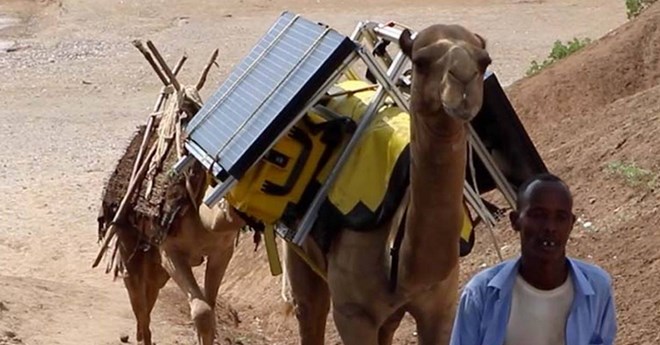
Wednesday February 23, 2022

A global charity seeking to improve the lives of children has turned to solar power to help deliver reading material to children in Ethiopia.
Save The Children Fund was established in 1919 and today is a global movement made up of 29 national member organisations working in 120 countries.
Among those countries is Ethiopia, which has had its share of hard times in various forms for as long as I can remember. One of my earliest memories is of a famine in Ethiopia in the 1970’s – and there have been multiple famines since.
Between famine, conflict, disease and isolation, many Ethiopian kids do it really tough – and the challenges extend to education. While the country has made solid progress on this front over the last couple of decades, it’s still difficult for children living in remote areas to receive basic but solid schooling.
Helping to bridge the education gap has been a service by Save The Children – using camels.
In Ethiopia’s Somali region, camels have long been used to transport goods over long distances. The charity’s mobile library program was established in 2010 and uses 21 camels, each of which was carrying 200 books at a time in wooden boxes strapped to their backs. These camels reach 22,000 children in 33 inaccessible villages.
A Switch To Solar And Tablets
In September last year, a pilot program kicked off where camels were fitted with solar panels used to charge tablets loaded with story books and learning materials. It seems the pilot has been a hit and now all Camel Libraries are being kitted out with panels and e-readers.
“The goal of this initiative is not just to provide children with books, but to ensure they have access to stories in their own culture and language, reflecting their reality and promoting a love of reading,” says the organisation. “Through incredible contributions from Save the Children’s Library For All, children in remote communities of the Somali Region can now access a wider selection of stories loaded onto the solar powered tablets.”
It seems there is plenty of opportunity for recharging the devices, with the “solar camels” visiting the villages every three to four days. Tablets and e-readers can be energy sippers – even my clapped-out 8-year-old reader gets by on a single charge each week and I use it daily.
Solar Power Improving Lives
When we discuss solar power here on SQ, we’re often referring to systems of multiple kilowatts in the case of home systems and megawatts for commercial installations and solar farms. But it’s initiatives like these that provide a reminder a little solar power – even micro-systems in the watts range – can go a long, long way in developing nations.
Micro-scale solar power can play an important role in helping to change the world for the better in multiple ways beyond emissions reduction, and the solar Camel Library is another example of it.
On a related note, an initiative SolarQuotes is involved with is via Pollinate Group, which supports low-income households in India by helping them replace expensive, polluting and dangerous kerosene lighting with solar powered alternatives.